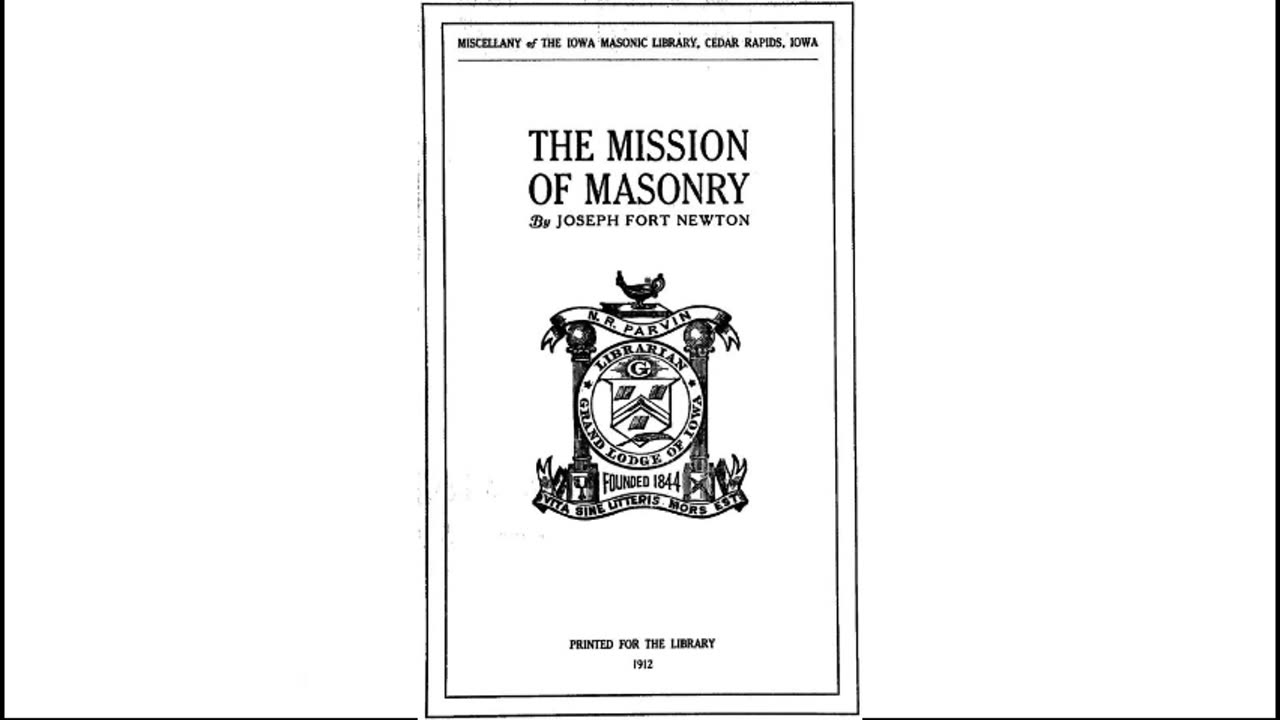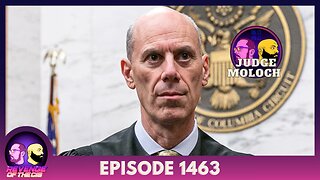Premium Only Content

The Mission of Masonry by: Joseph Fort Newton
The Mission of Masonry is a critical work by Joseph Fort Newton, originally delivered as an address at the 69th Annual Communication of the Grand Lodge of Iowa, A.F. & A.M., in 1912. Later printed for private distribution, this work serves as an exposition of Masonry's deeper purpose and responsibilities, extending beyond rituals to focus on the fraternity’s ethical, moral, and philosophical imperatives.
In The Mission of Masonry, Newton argues that Freemasonry is a vital moral force with the potential to uplift society by promoting universal brotherhood, ethical living, and the pursuit of truth. The work highlights how Masonic values—rooted in justice, charity, and knowledge—are not confined to the lodge but extend to all areas of life. Newton asserts that Masonry’s mission is to build better men who are committed to improving society through the application of Masonic principles. The text explores how Freemasonry transcends national, racial, and religious boundaries, advocating for unity and mutual respect among all people.
Newton also delves into the symbolic and allegorical aspects of Masonry, showing how these teachings are meant to inspire moral conduct and intellectual growth. He challenges Masons to take their responsibilities seriously, urging lodges to invest in Masonic education as a way of ensuring that members fully understand and embody the fraternity’s values.
Newton's address was instrumental in shaping Masonic education in the United States, and it laid the groundwork for his later works like The Builders and Short Talks on Masonry. The Mission of Masonry is still referenced today for its clear articulation of Freemasonry’s spiritual mission.
About the Author:
Joseph Fort Newton (1880-1950) was a renowned Baptist minister, Masonic scholar, and prolific writer. Raised to the degree of Master Mason in Friendship Lodge No. 7, Dixon, Illinois, in 1902, Newton became one of the most influential voices in early 20th-century Freemasonry. His contributions were not limited to the United States; he gained international recognition during his time as the pastor of City Temple in London, where he became a prominent figure in both religious and Masonic circles.
Newton served as the Grand Chaplain of the Grand Lodge of Iowa from 1911 to 1913. His role in promoting Masonic education was central to his career, and he was a member of several lodges and Masonic bodies throughout his life:
1. Friendship Lodge No. 7, Dixon, Illinois (where he was raised as a Master Mason).
2. Grand Lodge of Iowa (where he served as Grand Chaplain).
3. City Temple Lodge, London (during his tenure as pastor).
Newton was also associated with several appendant bodies and honorary memberships due to his contributions to Masonic education and philosophy. His influence extended beyond the lodge as he authored works that blended Masonic teachings with broader religious and philosophical ideas. His education included degrees from Southern Baptist Theological Seminary and Harvard University, and he received honorary doctorates from institutions like Tufts University and Coe College.
Newton's deep involvement in Freemasonry is reflected in his literary works, which continue to be staples in Masonic libraries. He was dedicated to promoting the idea that Freemasonry’s mission is to cultivate virtuous men who can lead society toward higher ideals. His writing style, blending eloquence with philosophical depth, made complex Masonic principles accessible to a wide audience. Works like The Mission of Masonry and The Builders are still studied for their insight into the esoteric and ethical dimensions of the craft.
Newton's philosophy emphasized that the lessons of Masonry are universal truths meant to guide members toward bettering themselves and, by extension, the world around them. His contributions to Masonic literature and education have made him one of the most celebrated Masonic authors of the 20th century.
-
 8:10:26
8:10:26
Deus Meum Que Jus
1 day agoThe World Set Free by H. G. Wells (1914)
120 -
 1:40:49
1:40:49
Redacted News
5 hours agoSomething BIG is coming on April 2nd as Trump plans "Liberation Day in America" | Redacted News
210K225 -
 1:11:34
1:11:34
Kim Iversen
6 hours agoOops! Vance and Hegseth Accidentally Leak War Plans on Signal | Big WIN For Medical Freedom Movement
51.3K94 -
 1:06:30
1:06:30
TheSaltyCracker
4 hours agoSaltcast Stream 03-24-25
102K131 -
 54:16
54:16
LFA TV
1 day ago‘Anything Can Be Solved With Dialogue’ | TRUMPET DAILY 3.24.25 7PM
20.6K1 -

2 MIKES LIVE
3 hours ago2 MIKES LIVE #196 Deep Dive Monday!
19.9K -
 1:34:27
1:34:27
The Officer Tatum
4 hours agoLIVE: TRUTH About Mahmoud Khalil, Leftists LOSE IT OVER Maga Hat, Bill Maher to MEET Trump | EP 84
62.7K26 -
 2:02:38
2:02:38
Revenge of the Cis
6 hours agoEpisode 1463: Judge Moloch
62K8 -
 28:53
28:53
Kimberly Guilfoyle
7 hours agoInside the JFK Files with Roger Stone | Ep. 207
71.3K19 -
 1:21:07
1:21:07
vivafrei
9 hours agoRFK Jr. to Ban Pharma Ads? Pierre Poilievre Rally CRUSHING IT? The Boasberg Battle & MORE!
179K122